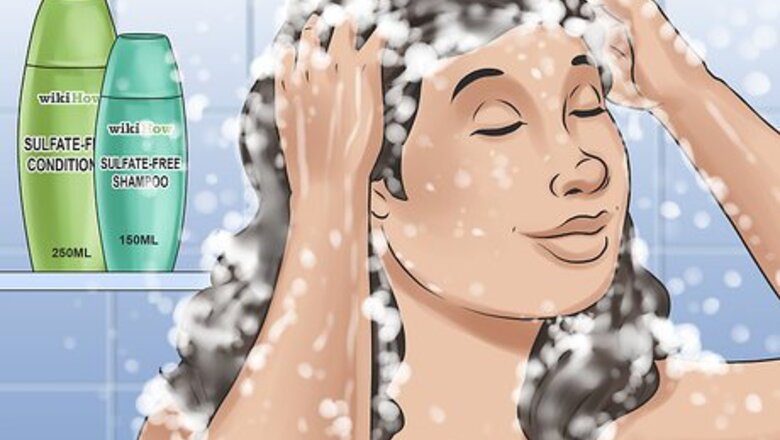
views
Shampooing and Conditioning
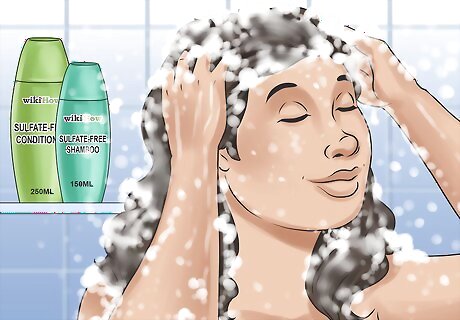
Wash your hair. Wash and condition your hair with sulfate-free products. Sulfates (such as sodium laureth sulfate and sodium lauryl sulfate) are chemicals that you often find in shampoos and conditioners. They can be very damaging to not only to your hair, but to your skin, scalp and eyes as well, and can prevent you from achieving that straight, glossy look. Run through the list of ingredients on your current shampoo and conditioner products. If sulfates are listed, replace them with sulfate-free products. Avoid products containing alcohol, which will dry out your hair and leave it crispy when you straighten it. Avoid clarifying shampoos and conditioners. These products strip moisture from the strands and can result in limp, lackluster hair.
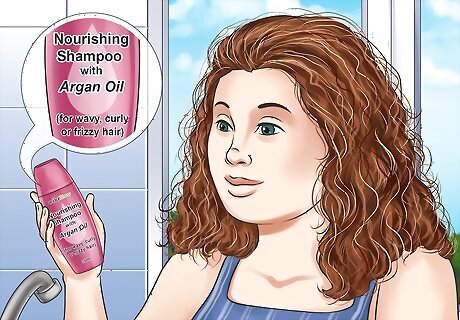
Choose smoothing products if you have wavy, curly or frizzy hair. For sleek and glossy results, you'll need to start the transformation to straight hair in the shower. Look for shampoo and conditioner products advertised as "smoothing." Check for ingredients like Argan oil, coconut oil and Moroccan oil to help smooth out your natural waves or frizz. After you apply the conditioner, run a wide-tooth comb through your hair to evenly distribute the product. Leave in for a few minutes before rinsing it out.
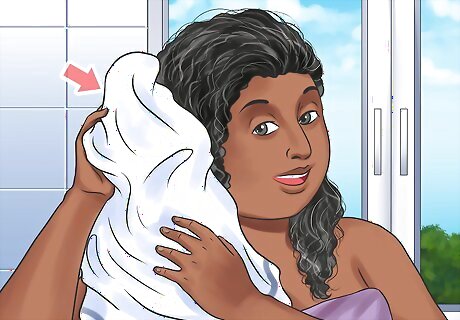
Towel dry your hair. Carefully squeeze out any excess water and then pat your hair with the microfiber towel, starting at the roots and working your way down to the tips. Avoid using terry cloth towels, since their tiny fibers can cause your hair to become frizzy. Instead, use an old T-shirt or a microfiber towel to dry your hair gently and effectively. Avoid rubbing or scrunching your hair, which encourages the curl you’re trying to tame! Dry your hair with smooth, gentle motions. Drying it roughly can cause your hair to curl up and become wavy.
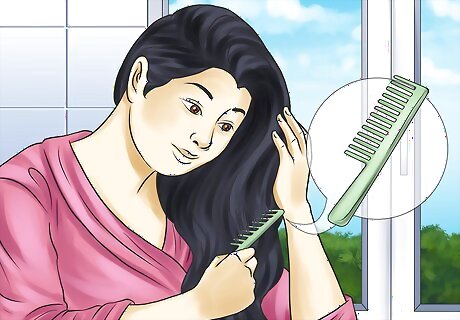
Detangle your hair. A sleek, straight look won’t work with a snarly mane! Use a wide-tooth plastic comb to work any tangles out of your wet hair. Start at the bottom and work your way up toward the roots, working in small sections. When finished detangling, apply a small amount of leave-in conditioner, avoiding the inch or two closest to the roots and focusing on the ends. Your arms might be tired by the end of all this combing and detangling, but your hair will be thanking you! Comb through your hair a few more times to make sure the conditioner is evenly distributed. After detangling, allow your hair to air dry until it is about 80% dry, then blow dry it the rest of the way. Blow drying wet hair can be incredibly damaging to the hair shaft. It can also cause your hair to become unnecessarily frizzy and unmanageable, so be patient and wait until your hair is almost air-dried before warming up that blow dryer.
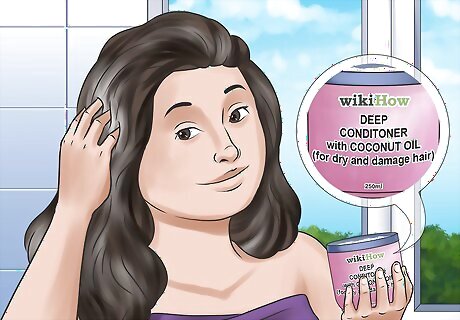
Use deep conditioners or hair masks once per week. The straightening process is damaging and can wreak havoc on your strands. If you have wavy, curly or coily hair that you straighten regularly, the process is even more damaging. No matter what your hair type is, you should deep condition your hair at least once per week to minimize damage and keep it healthy. Hair that’s happy and healthy can pull off any hair style, straight or curly. Deep conditioners and hair masks are very similar, but a mask usually works on strengthening hair while a deep conditioner creates more “slip”, meaning that the hair strands become smoother and easier to detangle. Consult your hairstylist if you need help choosing one or the other. They’ll be happy to assist you in reaching your style goals! Hair masks usually include ingredients like proteins, amino acids, natural oils and lipids, which can help to strengthen your hair. Hair masks and deep conditioners can be purchased at beauty supply stores, drug stores, or grocery stores. You can even make masks with ingredients that you already have at home. Simply search online for “DIY hair masks” and thousands of results will be at your fingertips.
Styling Your Hair
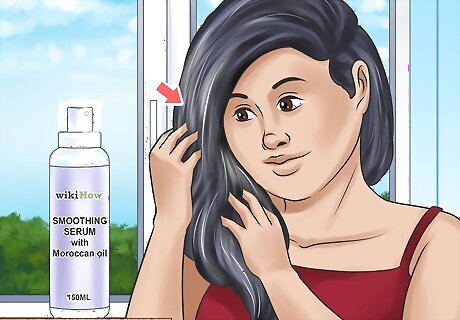
Use a smoothing serum. Before you blow dry, apply a smoothing serum product on your hair. Use the product sparingly – it only takes a small amount, especially if you have thin hair. Start at the roots and work the serum down to the tips. Always apply the serum from roots to tip for the smoothest, shiniest results. Try to use a serum product that lists Argan or Moroccan oil in the ingredients. Avoid serums that have alcohol listed in the ingredients, since alcohol can severely dry out your hair.
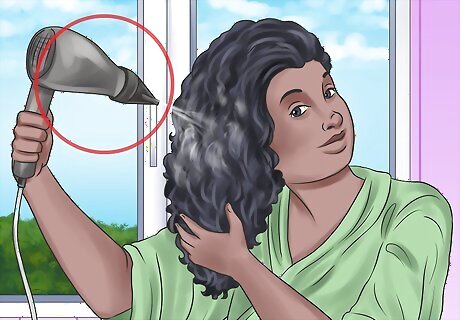
Use an ionic blow dryer. These blow dryers will dry your hair incredibly quickly and cause very little damage to your hair cuticle. As you’re using it, the blow dryer releases negative ions, which force the cuticle of your hair to lay down flat. A flattened hair cuticle results in straight, frizz-free, shiny hair. If you have wavy, curly, very thick or frizzy hair, an ionic blow dryer is even more essential. These hair types usually take longer to dry, and since the ionic dryer shortens drying time, you will cause less hair damage and save yourself lots of time.
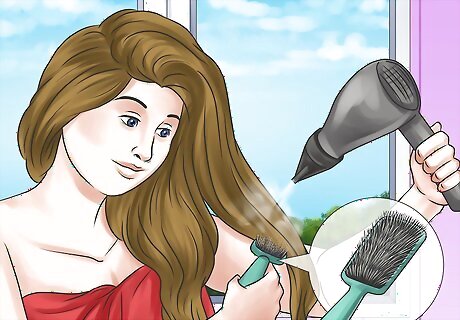
Blow dry your hair with a flat paddle brush. Buy one that has a combination of boar hair and nylon bristles, which will give you silky, shiny strands. These brushes are the best kind to use during the drying process. Place the paddle brush under a section of hair, then angle the blow dryer so that it's hitting the hair that's on the brush. As you move the brush down the section of hair toward the ends, move the blow dryer along with it as well so that it remains connected to the brush at all times. Do this to each section of your hair. Switch hands to get to hard to reach sections or rest one tired arm; you’ll be straightening your hair and getting ambidextrous at the same time. Always point the barrel of the blow dryer downward. This will blow air in the direction of the hair cuticle, rather than blowing against it and causing damage or more tangles. After your hair is dry, turn on the blow dryer’s cool setting and blow the cool air onto your hair for about one minute. This will make your strands extra shiny.
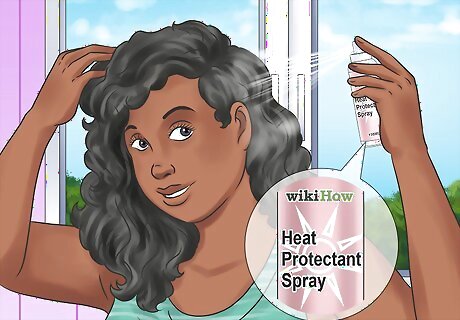
Apply a heat protectant spray to your hair. Heat protectant products won't completely prevent damage caused by straightening your hair with a flat iron, but they can certainly help to limit it, and every little bit counts. Spray one of these products all over your hair before flat ironing. Be sure to get the underside as well as the top. To make this easier, flip your head upside down and then spray the underside. Heat protectant sprays are often formulated for different purposes, such as flat ironing or blow drying. Select one that is made for flat ironing your hair. These can be purchased at beauty supply stores such as Ulta. Protecting your hair will be worth it in the long run, and save you from making trips to the salon to undo heat damage.
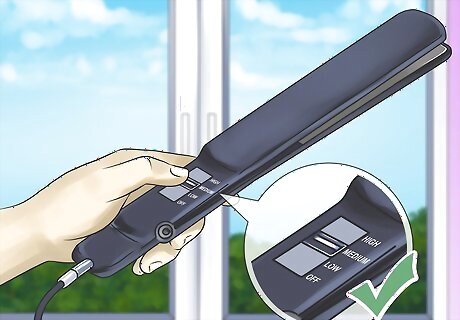
Set your flat iron to the appropriate heat setting. To minimize damage, be sure you're using the right heat setting for your hair type. Fine hair should be straightened on a low setting. If you have curly or wavy hair, use a medium setting. For thick to coarse hair, use a medium-high setting. Invest in a high-quality ceramic flat iron if you can! These salon-quality tools are worth the extra money if you plan to straighten your hair often. A high-quality ceramic flat iron could last for years, unlike non-ceramic versions, which will need to be replaced often. The ceramic plates on the iron will straighten your hair quicker than other types of flat irons, causing the least amount of damage.
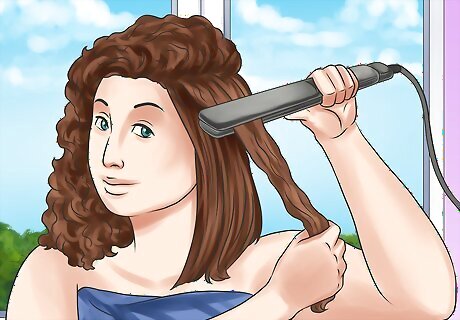
Flat iron your hair. After you spritz the heat protectant on your hair, separate your hair into small sections and run the flat iron over each one. Start near the roots and slowly move toward the ends. Avoid ironing over the same section of hair more than two or three times, which causes damage. Be certain that your hair is completely dry before you start flat ironing it to avoid the hair-burning sizzle and smell. Listen for a sizzle – if you hear one, stop flat ironing your hair immediately. This means that your hair is still wet and needs to be dried more. Use your blow dryer for a few more minutes until your hair is thoroughly dry, then grab that flat iron and start again.
Setting Your Style with Products
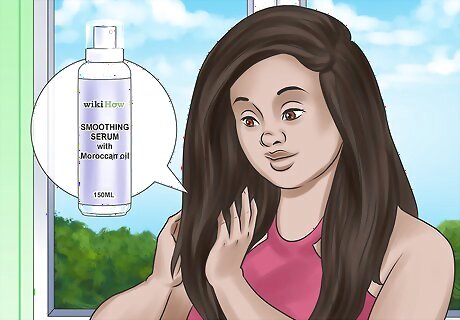
Tame fly-aways with a small amount of smoothing serum. Use a tiny dab of serum to smooth down any fly-aways or frizz. Concentrate on the ends of your hair, since they tend to dry out the fastest. Make sure you use the product sparingly – your hair can end up looking greasy if you use too much, which is not quite the look you’re going for! After applying the serum, wait a few minutes before moving on. This will give your hair time to cool down completely.
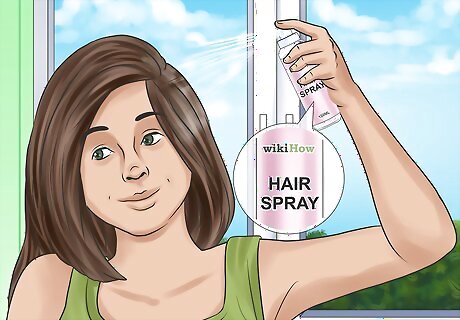
Set your hair with hairspray or finishing spray. Once your hair has cooled down, lightly mist a hairspray or finishing spray over your entire head to set the hairstyle. Another technique: spray the product onto the bristles of your flat paddle brush and then gently brush your hair with it. This can help to prevent any stickiness that the product could potentially cause. If you hear any sizzling when you spray on the product, this means your hair hasn’t cooled down sufficiently. The sizzle sound means you are causing damage to your hair, so set down your spray bottle and wait a couple of minutes for your hair to cool down some more.
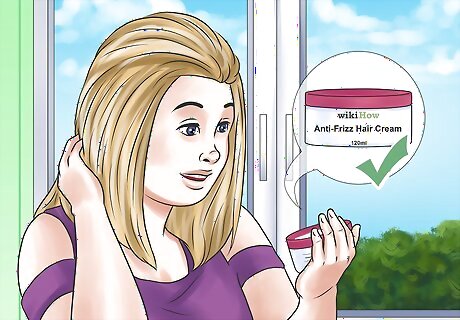
Experiment with additional products. Your hair’s texture and length, as well as the climate where you live, will play a role in how your straight style holds up throughout the day. Think about using an anti-humidity (or anti-frizz) cream or spray if you live in a particularly humid area. Try styling cream if your hair is short and needs a little more weight to keep the curls from springing back up. The cream will lightly weigh the hair down and prevent this from occurring. Don’t be afraid to try something new; if it doesn’t work, you know you’re one step closer to finding a product that does! Experiment with a shine spray product, which will specifically add shine to your hair, but use it sparingly. These are often silicone-based products and will need a special shampoo to remove the residue.
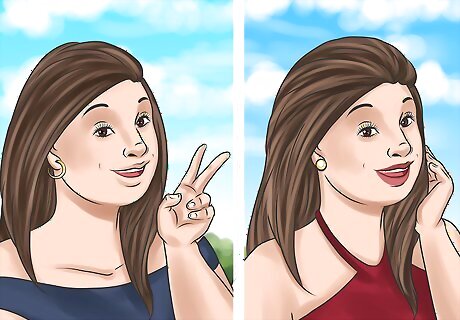
Try to make the style last for another day or two. This process can definitely be time-consuming, so aim to do it every other day or every three days. Rock the always-fashionable shower cap in the shower to protect those silky straight strands from the water. In between washings, touch up your limp roots and remove oil with a dry shampoo. Use a flat iron to spot-straighten any strands that have re-curled overnight. If you use smoothing and straightening tools and products on a regular basis, you run the risk of damaging your hair. Make sure to use deep conditioning treatments at least once per week to repair any damage and get your hair back to its usual gorgeous self. Happy straightening!













Comments
0 comment